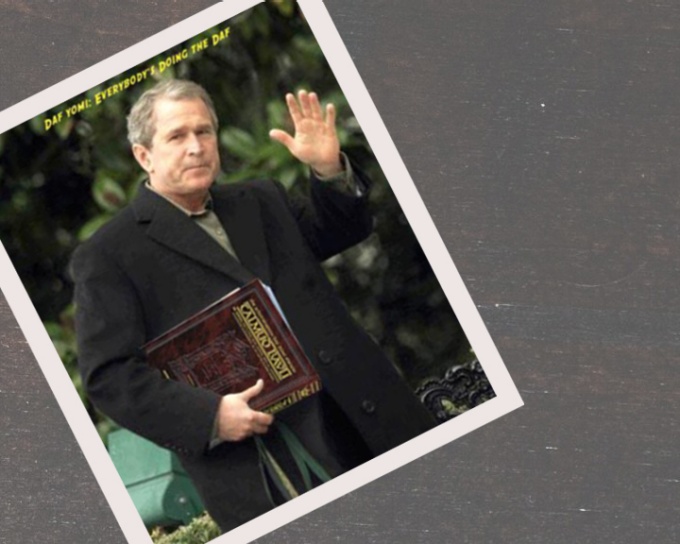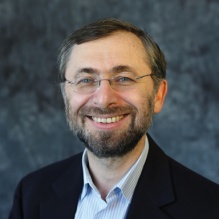Jews and Diversity: How to Ask about Jewish American Heritage Today?
Gordon Gross
Memorial Lecture
March, 24, 2021
12 p.m. to 1 pm.
Speaker
Sergey Dolgopolski
Sponsored by the
Department of Jewish Thought
To register (optional) email us at
jewish-thought@buffalo.edu
or
use the Zoom link below to attend

An image of the former President Geroge Bush with the volume of the Schottenstein Talmud. Inscription on the photo reads: "A Page a Day: Everybody doing a page of the Talmud a day!"
How to Ask about Jewish American Heritage Today?
What did Jews and Jewish tradition contribute to America? Answers to this question vary from Andrew Heinze's historical and seemigly neutral claim that "the american soul" (whcih is also the title of his 2004 book) in the last century was shaped by Jewish psychiatrists, psychoanalysts, and philosophers, who emigrated from Europe during the war and post-war times, to a defensive (to say the least) 'Jews will not replace us" during the events in Charlottesville in 2017.
Questions of heritage are difficult ones.
Is heritage a blessing to embrace or a burden to try to get rid off? Can heritage even be tought of as contrubution of the previous generations to our lives today? Is heritage something on which I can decide either to celebrate it or to leave behind? In either case, is this a matter of the past, and not of the present day?
Questions of Jewish heritage in America are even harder: Is this about what Jews contribute to America? Or is it what America inherited from the Jews in the very core of how America came to be, what is it now, and where it heads? To add to the mix: what Jewish America is in political-geographical terms: USA? North America? The pan american America? American Jews in Israel?
These questions complicate even further the already complex discussion on inclusion and exclusion of Jewish Americans from the current spectrum of diversity and minory.
To examine the close connection between heritage, diversity and minority, this lecture will launch a conversation between classical Rabbinic literature and contemporary Jewish, Catholic and Secular thinkers, to map the question of Jewish American Heritage as the question of American Jewish Heritage today.
This lecture is conceived as first in the series of Gordon Gross Memorial Lectures.
Professor Sergey Dolgopolski

Sergey Dolgopolski is Gordon and Gretchen Gross Professor of Jewish Thought, Professor and Chair in the Department of Jewish Thought, Unviersity at Buffalo, SUNY.
His general area of interest is the variety of ways in which philosophy and literature interact, creating new philosophical concepts and new literary forms. He specializes in the Talmud as a body of text and thought seen from poetic, rhetoric and philosophical perspectives, with a particular interest in mutual hermeneutics of philosophical, rhetorical and Talmudic traditions, and with emphasis on mutually shaping engagements of poetic Talmudic and philosophical thinking.
His newest book, Other Others: The Political After the Talmud (Fordham University Press, 2018; available for purchase on Amazon), puts contemporary political theory and a literary-theoretical exploration of the core text of Rabbinic Judaism, the Talmud, into both a fruitful and tensed conversation one with another. In the words of the book's catalogue description: "Denying legal and moral existence to those who do not belong to a land, while tolerating diversity of those who do stabilizes a political order—or does it? Revisiting this core problem of contemporary political theory, Other Others turns to the Talmud as an untapped resource for a conception of the political and a take on excluded others our philosophical and theological traditions have effaced."
This lecture will be offered free of charge online, with donations suggested.